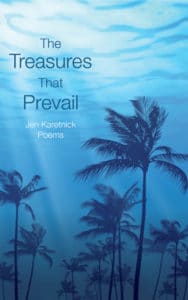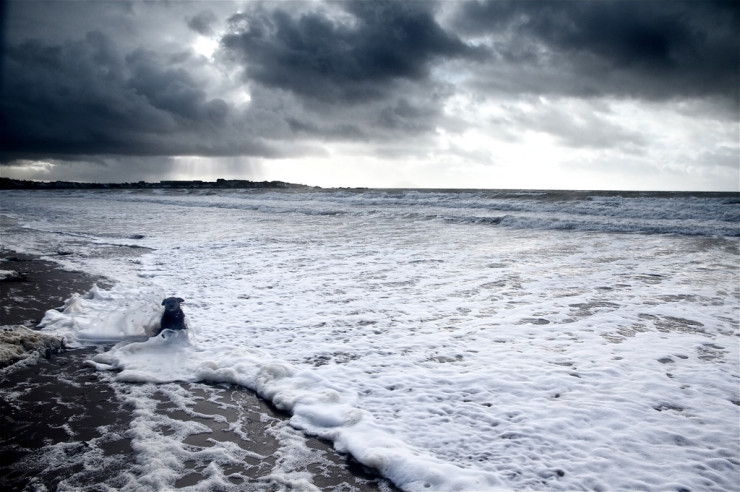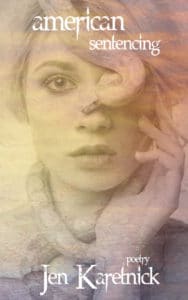Publishing a collection of poetry is a big deal. Publishing two books of poetry with different publishers within a span of four months is a huge deal. And that’s exactly what poet and writer Jen Karetnick has done.
In May, Winter Goose Publishing published Karetnick’s American Sentencing, a collection of 71 poems that generally address the subject of illness. Karetnick dedicated the collection to “those who suffer from chronic, invisible illnesses” and to “their physicians and caretakers.” The title contains a kind of irony—we in America are known for our “problem-solution” outlook on life and our discomfort with illness and disease that stubbornly resist categorization and treatment. Shouldn’t a pill or surgery fix everything?
Well, no. And this is what Karetnick explores. Depression. Migraine headaches. Night sweats. Postpartum depression. Chronic fatigue. These are problems that often defy a cure and also ones often associated with our fast-paced, workaholic American culture (and thus the “American” of the title).
We and our doctors go looking for causes of our ailments and find dead ends and “negative results.” A cure usually follows diagnosis, and without a diagnosis, we are left with—what, exactly? Here’s the title poem:
Between you and me, there is no
doubt in your mind, I have been here before
and will be again for “pseudo-
gout, ” “reversible lupus, ” diseases ephemeral as
the skeptical blink. Unimpressive, you say. It is no
difference to you. Once again, a test outcome
is negative, as if I am less than the sum of zero,
a body that registers nothing, not even the pretzel
knot of all its parts. Look down my throat. Peer
in my ears. Allow your instruments to dictate
the truth as you have learned it—
joint connecting symptoms to diagnosis,
not the tissue of intuition, not
the fatty imagination, not the instinct of the
gut that is flexible and in no way demonstrable.
American Sentencing is both arresting and relieving—our own physical and mental illnesses and experiences are not abnormal; someone else knows what we struggle with.
In The Treasures That Prevail, to be published this month by Whitepoint Press, Karetnick addresses a different and yet more global kind of illness—climate change. In the 65 poems in the collection, two narrators essentially tell the stories of climate change and its impact on the coastal community of Miami. In one sense, climate change is much like the “chronic, invisible” illness she describes in American Sentencing. In another sense, though, it is much more obvious, as in this poem about fishing:

This is no Hemingway tale.
The fish we catch are not fabled
and will not make our fortune,
harnessed to nothing more
than some jerk spices
and the bottom of a frying pan
liberally coated with oil
so the flesh will not stick
as ours does to the sheets
we lie on at night
when the waves have quieted
like overtired children. We cast
sidearm the way we used to
heave a baseball into mitts
to avoid throwing the brims
of each other’s hats
into the ocean with the bait,
although this has happened,
and this is what we have reeled in:
saturated reminders of another life
when the mean seats of a marlin
stadium meant a blistered nose
for a couple of days and not this
flooded, floorless amphitheater
where the only entertainment
is skin after peeling skin,
eternal, infinite, varying only
in hit, fight and run.

Jen Karetnick
Not everyone accepts climate change as a real phenomenon, of course, but then there are any number of physical ailments that we are told are “products of your mind” or “all in your imagination.” And yet they still have very real physical effects.
Karetnick received an MFA in poetry from the University of California-Irvine and an MFA in fiction from the University of Miami. She is the author of several books of poetry and four chapbooks: Prayer of Confession, Landscaping for Wildlife, Bud Break at Mango House, and Necessary Salt.
In both American Sentencing and The Treasures That Prevail, Karetnick is not insisting that we agree with her. She is simply asking us to listen, and to consider, to ponder what she is saying and seek the truth in it.
Related: Our review of Karetnick’s Brie Season
Photo by Graeme Law, Creative Commons, via Flickr. Post by Glynn Young, author of the novels Dancing Priest and A Light Shining, and Poetry at Work.
__________________________

“I require all our incoming poetry students—in the MFA I direct—to buy and read this book.”
—Jeanetta Calhoun Mish
- Poets and Poems: Sandra Marchetti and “Diorama” - April 24, 2025
- Poets and Poems: Christina Cook and “Roaming the Labyrinth” - April 22, 2025
- Longfellow’s “Paul Revere’s Ride”: Creating a National Legend - April 17, 2025


Maureen says
Good introduction to a strong poet.
Bethany R. says
“Once again, a test outcome/ is negative, as if I am less than the sum of zero”
Powerful poems. Thank you for highlighting Karetnick’s poetry.
Jane Ellen Glasser says
Jen Karetnick is a poet whose work I recently discovered and greatly admire.
Sandra Heska King says
What Bethany said.